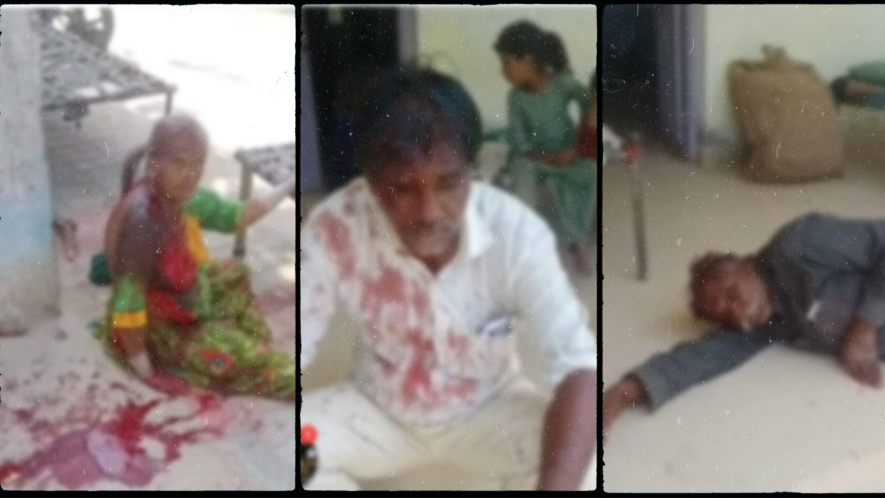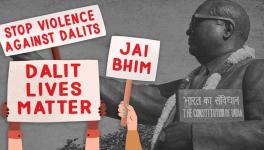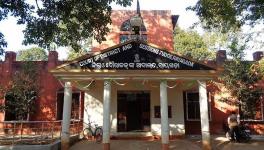Untouchability - A Reality for Dalits in Gujarat Despite Constitutional Ban

On an early morning of October 26 this year, Govind Vaghela, a dalit farmer from Ner village of Bachau taluka, Kutch, Gujarat, was informed that a cattle had entered his farmland and was destroying his crop. He immediately left for his land only to find a group of men with an axe, sticks, and iron rods waiting for him while his crops were already ransacked.
"The group led by one Kana Ahir, an upper-caste man of the village, asked why did we (Vaghela and his family) enter the Ram temple on the day of the pratisthan ceremony on October 20 (this year) while hurling casteist slurs," said Vaghela.
"They stole my cell phone and began to thrash my uncle and me. They even thrashed the autowala so that we could not get out of the situation and threatened that they were going to the village to kill my father. My uncle and I received injuries on our heads and limbs," Vaghela added.
While Vaghela and his uncle collapsed as they tried to run away from the attackers, about 20 men reached Vaghela's home, stormed in, and brutally thrashed his 64-year-old father Jagabhai Vaghela, his wife Baddiben Vaghela, son Bhurabhai and nephew Hasmukh for entering the temple. The six family members were rushed to Bhuj General hospital with severe injuries on the head and limb.
Following the incidents, two FIRs were filed in the local police station against 20 accused under IPC sections 307 for attempt to murder, 323 for causing hurt, 324 for causing hurt by dangerous weapons, 452 for house-trespass for causing hurt, 120B for criminal conspiracy, 506 for criminal intimidation, 294B for obscenity, sections of the rioting and sections of the scheduled caste and scheduled tribe (prevention of atrocities) act.
Noticeably, Vaghela had stated in the complaint that his family had been warned against entering the temple by the upper caste villagers. However, on October 30, the Kutch (east) police claimed in a press conference that the villagers didn't object to the dalit family entering the temple, and the incident was a result of a political rivalry.
"The victim Jagabhai Vaghela had won the gram panchayat by-polls in 2018 defeating Bhanji Suthar who has been named as primary accused and conspirator of the attack," Mayur Patil, Superintendent of Police, Kutch (east), told the media.
This is not a one-off incident of the practice of untouchability and social ostracisation of dalits in Gujarat. In March this year, Banaskantha police booked 14 villagers belonging to an upper caste of Nalasar village, Palanpur taluka, after complaints of social boycott and discrimination against 80 dalit families.
As per the FIR registered by Jayesh Bhatiya, a dalit agrarian labourer of Nalasar, after a legal battle over a plot of land between a dalit villager Jitendra Kalaniya and Sardarbhai Sucholbhai Choudhary, the upper caste residents of the village decided to boycott 80 dalit families.
The villagers have been told not to provide the Dalit families with rations, employment as agrarian labourers, allow them to ride public vehicles and cut their hair, among other practices of social discrimination, Bhatiya stated in the FIR.
A survey conducted by the Navsarjan Trust, an NGO that works with Dalits in Gujarat, between 2007-2010 in 1,489 villages across 14 districts revealed that untouchability is far from being eradicated despite political rhetoric and a constitutional ban. The survey also shows that the practice has intensified in rural Gujarat over the years.
As per the survey, 98 forms of untouchability are practised by upper caste communities against Dalits across the state.
The most widely practised among them is Rampatar, the practice of serving Dalits in separate utensils. Navsarjan Trust revealed that 96.8% of upper caste people surveyed practice Rampatar against dalits in rural and urban Gujarat.
In rural Gujarat, where the practice of untouchability is more rampant, dalits usually live at one end of the village away from the main village. The survey by the Navsarjan Trust claims that even dalit children face discrimination daily. The report shows that discrimination against Dalit children is prevalent in 53.8% of government primary schools. In most cases, Dalits children are made to sit in a separate row while receiving their mid-day meal or even made to clean the toilet in the school. Adding to that, Dalit children are not allowed to participate in the school's morning prayers and are made to sit separately from children belonging to upper castes.
The report adds that the village well and crematorium is off limit for the dalits, and they are not allowed to cut hair in the village, keep a moustache or ride a horse. The upper caste villagers avoid stepping the shadow of a dalit, sitting together at a social function and bar them from entering temples.
In March 2016, a separate well came as a relief for the dalit women of Barbakot village in Amreli. For years, dalit women of the village would wait in line for hours, sitting carefully away from the village well until some woman from Koli Patel or Bharwad communities would fill up their pot from a distance.
This is not a story of one village. Sarvaiya family were settled in Delwada village in Una taluka by the Gujarat government after the youngest son of the family was burnt alive in their home for being in a relationship with an upper-caste woman. The women of the Sarvaiya family walk about a kilometre to fetch water despite there being a village temple with government facilitated water supply about 30 metres from their house.
In Becharaji village of Rantej taluka in Mehsana, Dalit women fetch water from a separate water tank strategically placed at a distance from the village well so that water spilling from the tank does not flow back towards the well. There is a tube well at one end of the village where Dalits houses are concentrated, but the water is saline and not drinkable.
In July 2018, a special court in Gujarat convicted six people belonging to the upper caste for not allowing a Dalit woman to get water from the village well and assaulting her.
On November 25, 2010, then 19-year-old Sadhna Manubhai Vaja, a resident of Sugala village in Gir-Somnath district of Gujarat, had gone to fetch water from a village well. Dhirubhai Khasia, an upper-caste woman of the village, stopped her from fetching water, hurled casteist abuse, and shouted that water would get impure if she (Sadhna) fetched water from the same well.
However, when Sadhna objected to it, Khasia, her husband and four other men grabbed her by her hair and thrashed her. Following this incident, Sadhna filed an FIR at the Kodinar police station.
In February 2017, the upper caste communities of Randej village of Bechraji block in Mehsana district decided to boycott the dalit families of the village after the dalits refused to pick dead cattle as a mark of protest against a separate seating arrangement for dalits during a temple ceremony in the village.
The upper caste community of Randej responded by declaring a penalty of Rs 2,100 on anyone who maintained social contact with the dalits.
As a result, shops stopped selling essential commodities like cooking oil, food grain, vegetables and milk, public vehicles refused to commute to the areas where dalits lived, and dalit daily wagers were refused jobs.
The dalit families of Randej filed an FIR. However, the situation was sorted only after dalits met the district collector, asking him to provide transport facility, cash dole to those who could not earn because of the social boycott, and ensure smooth distribution of daily needs from shops under police protection.
A week after the incident, Dalit families of Par village of Santalpur taluka of Patan district were forced to migrate to Patan town following their social boycott by the dominant caste of the village. The families sat on a dharna in front of the Collectors office in Patan before settling back to their village. The upper caste community of the Par, a village dominated by Darbar (Kshatriya community), decided to boycott the dalits after they refused to pick cow carcass, a work reserved for only dalits in the state.
In May 2019, Mehsana police registered FIR against the sarpanch and deputy sarpanch amongst five villagers of Lhor for ordering a social boycott of dalit families of the village. On May 8, when a dalit groom took out his wedding procession on a horse, it was not taken well in Lhor, a village dominated by the Thakor community prompting the social boycott.
Noticeably, in March 2019, Minister of Social Justice and Empowerment Ishwar Parmar told the Gujarat Assembly that crime against dalits in Gujarat had risen by 32% from 2013 to 2018. Parmar stated that in 2018, 49 cases of atrocity were registered in Ahmedabad district, 34 cases were registered in Junagadh, 24 in Surendranagar district and 23 in Banaskantha district.
As per Scheduled Caste and Scheduled Tribe Cell data, 568 cases of atrocity against dalits have been registered till May 2019. There have been 16 cases of murder, 30 cases where victim(s) have been grievously hurt and 36 cases of rape. The data also reveals that the number of atrocity cases against dalits has been soaring each year since 2010. In the year 2010, the total number of cases of atrocity registered was 1,006. In the year 2011, it was 1,083, 1147 in 2013, 1,355 in 2016, 1,515 cases in 2017 and 1,544 cases in 2018.
Noticeably, the number of cases of rape has gone high from 39 in 2010 to 51 in 2011, 70 in 2013 and 108 in 2018. In the year 2019, 36 cases of rape were registered till May 2019.
As per NCRB report 2020, the number of recorded crimes against scheduled caste was going down in Gujarat with 1326 cases compared to 1416 in 2019.
Get the latest reports & analysis with people's perspective on Protests, movements & deep analytical videos, discussions of the current affairs in your Telegram app. Subscribe to NewsClick's Telegram channel & get Real-Time updates on stories, as they get published on our website.
























